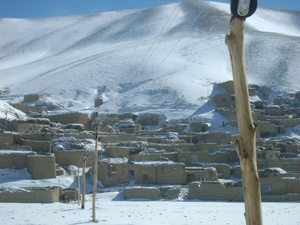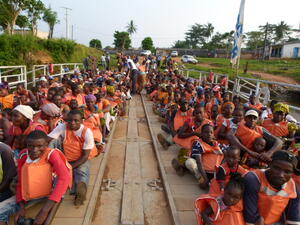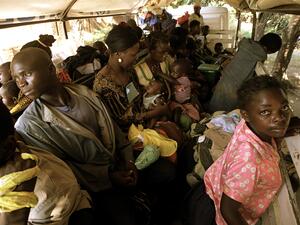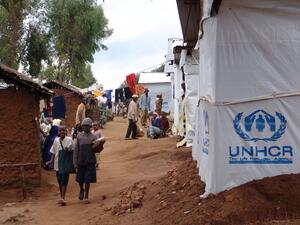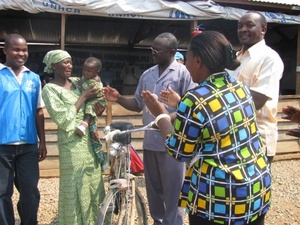Congo's former "Triangle of Death" becomes source of hope again
Congo's former "Triangle of Death" becomes source of hope again

Making bricks for the construction of a school in Kisnadi, North Katanga.
MITWABA, Democratic Republic of the Congo, Aug. 11 (UNHCR) - Not so long ago central Katanga province was known as the "triangle of death" because of fighting between the Congolese army and Mai Mai militias who killed, raped, pillaged, burned villages to the ground and displaced some 220,000 people in 2005 and 2006.
Today it's a different story, thanks to the reintegration and rehabilitation efforts of UNHCR and its partners.
"In Mitwaba, one can see the lives of these displaced persons transformed because of the intervention of UNHCR and its partner GTZ," said Eusebe Hounsokou, UNHCR's Representative in the DRC, referring to the German international cooperation enterprise known by its German initials GTZ.
During the worst of the displacement, UNHCR responded with emergency aid to the displaced, who were often forced to live in squalid conditions. The brutal wave of violence destroyed not only schools and health centres, but also bridges and roads, so that little aid could get through to villages in the territories of Mitwaba, Malemba-Nkulu, Manono and Bukama.
That's why the UNHCR-GTZ project now aims to construct roads, bridges, shelters, water points and other facilities to make it possible for displaced people and returned refugees to rebuild their lives after spending many years in exile in neighbouring countries. Implementation of the project in 39 villages began in March 2007, helping more than 10,000 families.
They include individuals like Mwape, a 24-year-old mother of three who was abandoned by her husband when one month pregnant with her last child. She found safe haven in Mitwaba territory after living through a series of horrors typical of those that convulsed central Katanga in recent years.
Mwape's father and brother were arrested by the Congolese military in February 2005, accused of collaborating with the Mai Mai. Both died in prison a few months later. Mwape returned to the village she had fled, only to find "the military razed the village and there was neither a single sheep nor a dog walking in the streets."
She finally made it to Mitwaba in February 2006, where she now lives mercifully free of fears of new clashes. She's glad to be able to farm under the UNHCR-GTZ programme and feed her own family. After all she's been through, she says, "life now seems to be giving me a better chance."
In an area once known as the breadbasket of Katanga, farming had been devastated by the fighting and people had been reduced to eating mainly manioc.
In partnership with the Food and Agriculture Organisation (FAO), the project has helped some 4,000 farming families with vegetable gardening and subsistence farming. Local people themselves came up with the idea of diversifying agriculture production to improve food security.
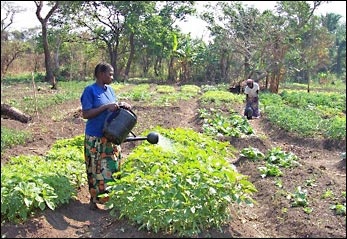
Women in Mitwaba water their beans and soya plants which are eventually sold in the market.
Last year the programme also trained 45 carpenters and built 305 houses. More than 300 people also received bicycles, breeding cows and seeds for cash crops to allow them to make money and support themselves. Other credit and savings schemes are helping farmers start commercial agricultural activities.
The project has already rehabilitated 54 kilometres of feeder roads, built eight bridges and constructed 10 wells to allow people to move more freely and sell their produce in markets. Within the UN Country Team, UNHCR is responsible, along with the United Nations Development Programme, for helping to meet the needs of DRC communities in post-conflict areas in order to ensure the smooth reintegration of returnees and pave the way for future development.
Rehabilitation will continue throughout 2008 "but we recognize that Katanga is an immense region and we still do not have access to all the villages that need help," said Hounsokou. "We still face enormous logistical challenges."
By Francesca Fontanini in Democratic Republic of the Congo



